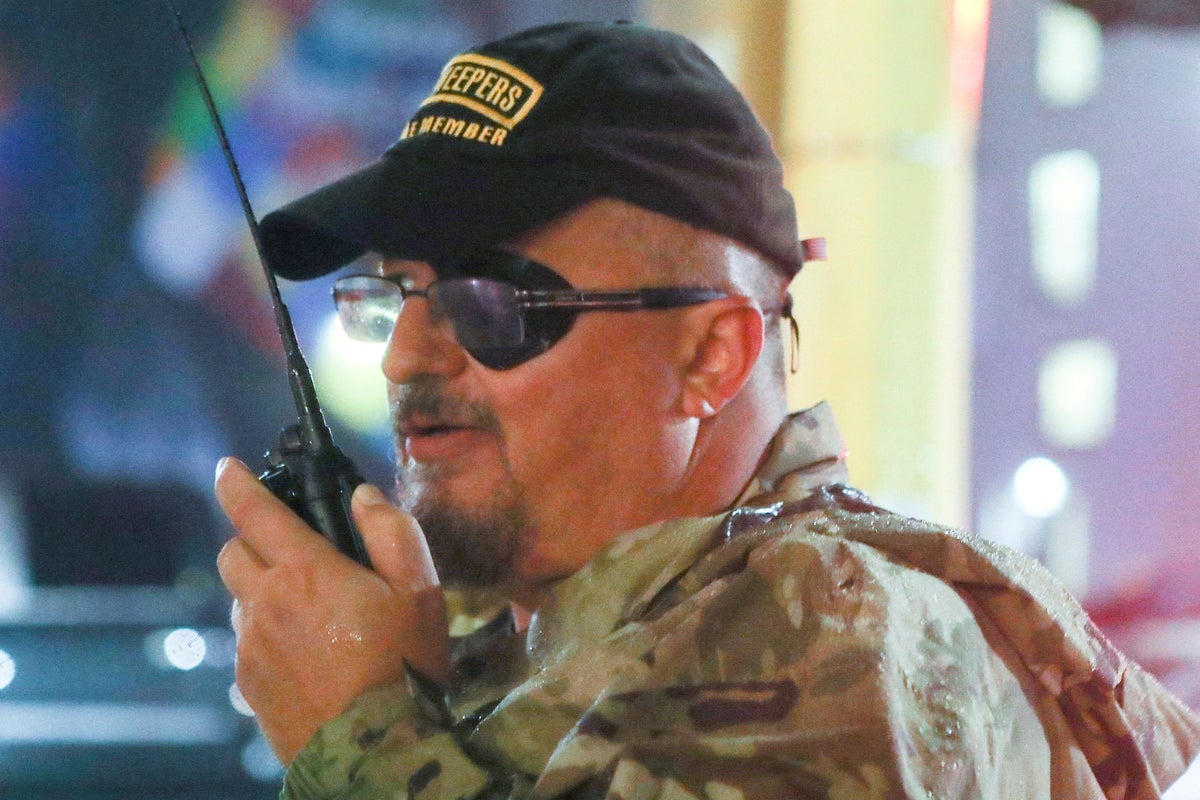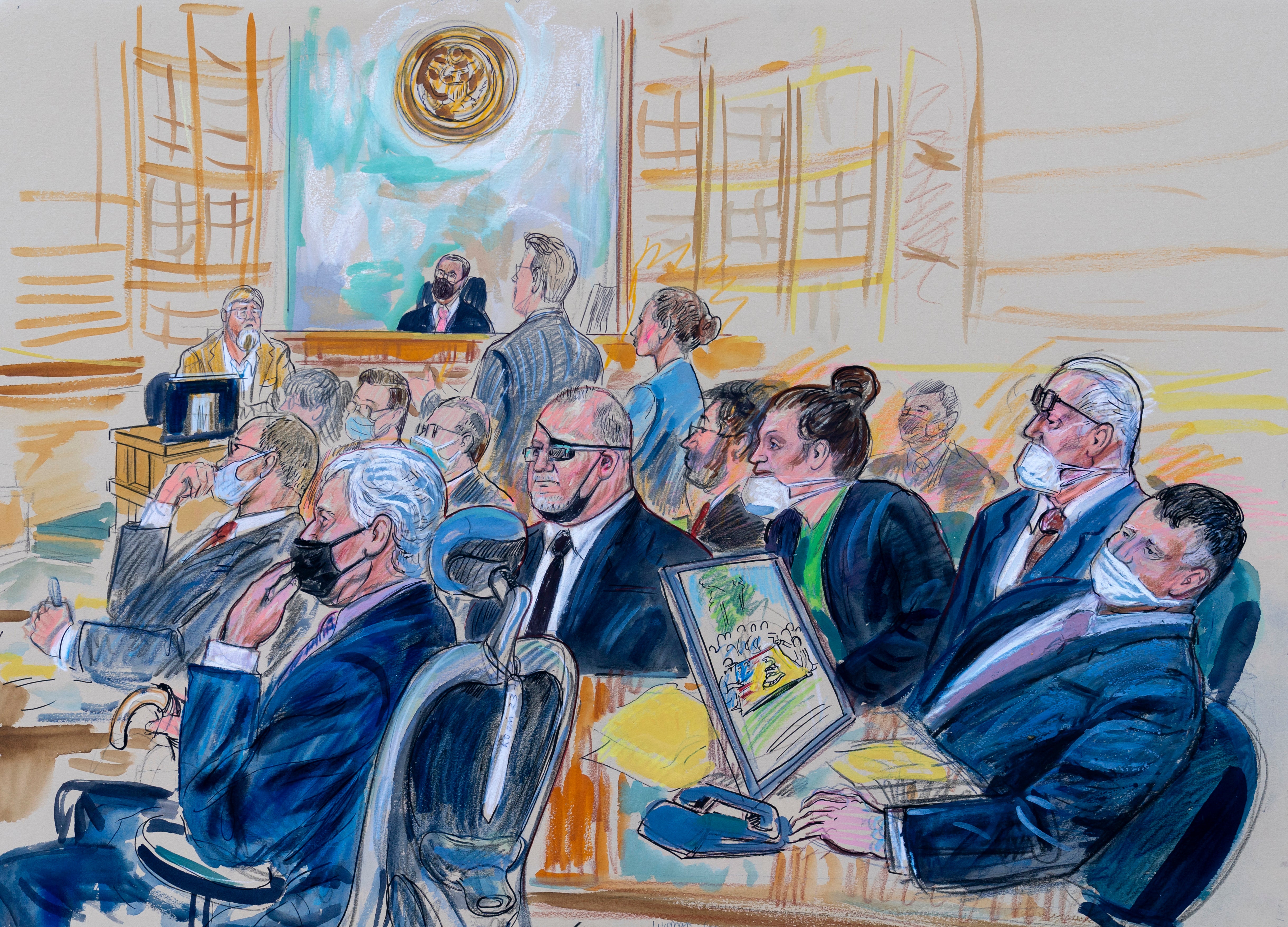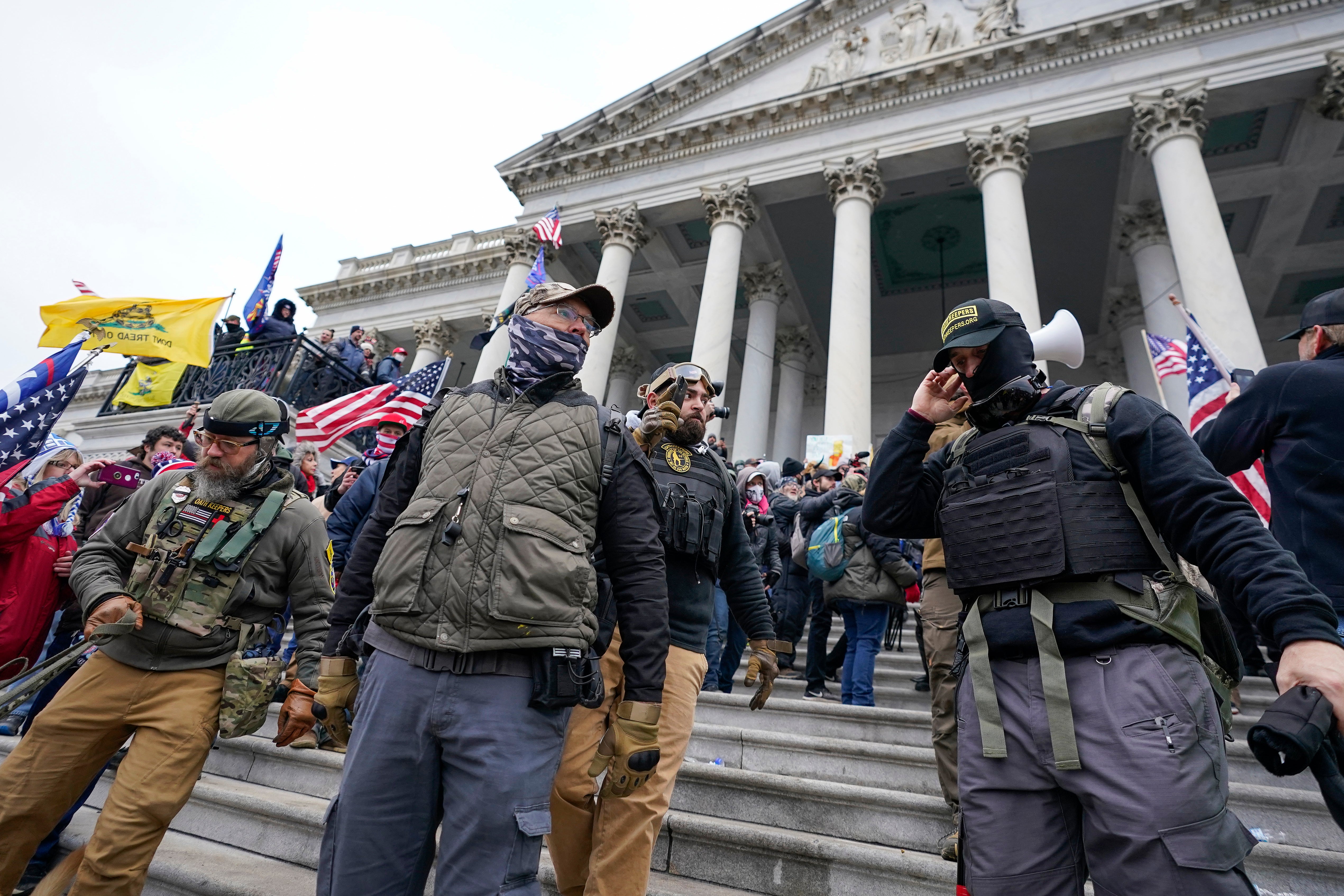
Jurors in Washington DC will determine whether the leader of a far-right anti-government militia and four others tied to the group are guilty of seditious conspiracy after plotting an attempt to violently disrupt Congress on 6 January, 2021.
Stewart Rhodes and four other defendants have pleaded not guilty to the charges against them, while federal prosecutors argue that the Oath Keepers spent weeks organising their members and associates for an “attack” fuelled by baseless conspiracy theories that the 2020 presidential election was stolen from Donald Trump.
Investigators and prosecutors have presented reams of evidence, including text messages and video, appearing to show Oath Keepers energising supporters with violent rhetoric, coordinating a cache of weapons and supplies, and preparing to use force while marching on the US Capitol.
The trial marks the highest-profile proceedings and most significant charges yet in the aftermath of the attack – separate from but parallel to a congressional investigation into the events leading up to and surrounding the assault.
Here is what we have learned so far in the trial
Stopping the election ‘by any means necessary’
A key government witness and former Oath Keepers member testified that he was prepared to die and say goodbye to his family to keep Donald Trump in office and stop Congress from certifying the 2020 presidential election, “by any means necessary.”
In text messages from December 2020, James Dolan said he believed there was “no coming back” from what he was preparing to do, and that he would consider himself “lucky” if he got “a prison sentence, tagged with treason, or a bullet”
“I think my biggest trouble is trying to convince myself to say good bye to my family, after all they had to endure, with the likelihood of never seeing them again,” the former US Marine wrote in a message to other Florida Oath Keepers, according to messages shared with the court.
“I meant it literally,” he told the jury.

If then-President Trump refused to act, the group was prepared to “stop the certification of the election … by any means necessary,” Dolan said in court. “That’s why we brought our firearms.”
Dolan had previously pleaded guilty to one count of conspiracy and one count of obstruction of an official proceeding in September. He has testified in a separate trial involving five other Oath Keepers.
Days after 6 January, Mr Rhodes typed a message intended for then-President Trump, calling on him to “save the republic” or “die in prison.”
A covertly recorded conversation between government witness and Mr Rhodes appears to capture Mr Rhodes saying that his “only regret” on 6 Janury was that he was not armed that day.
“We should have brought rifles,” he said. “We could have fixed it right then and there.”
He also said he would “f****** hang” House Speaker Nancy Pelosi “from the lamppost.”
Dozens of text messages used as evidence
Mr Rhodes called on his allies to reject a potential Joe Biden presidential victory only hours after polls had closed in November 2020, kicking off the militia leader’s campaign of amplifying unfounded election fraud claims to fuel plans for an attack in Washington, according to messages shown to the jury.
The militia leader told defendants that “patriots are taking matters into their own hands” after determining that then-Vice President Mike Pence is “doing nothing,” according to messages shown to the court. Mr Pence ultimately certified the election results in the ceremonial proceedings after lawmakers re-convened at the Capitol hours after the attack.
“Patriots had sent a message,” Mr Rhodes wrote to the group. “You ain’t seen nothing yet.”
“We are reloading!” defendant Kelly Meggs replied.
In audio of Mr Rhodes shared with jurors, Mr Rhodes said his only regret is that the group “should have brought rifles” to the Capitol. “We could have fixed it right then and there.”
Video evidence shared with the jury included footage from The Independent’s November 2020 interview with Mr Rhodes in which he baselessly claimed Democrats “stole” the election and that Mr Biden’s presidency is “illigitimate”.
That interview was shared among members of the group, according to investigators.
Prosecutors have also presented evidence that the group sought an “alliance” with the far-right nationalist gang the Proud Boys and the Three Percenters, another anti-government militia.
Three days after then-President Trump told his supporters to join a “wild” protest on 6 January, Mr Meggs – a leader of an Oath Keepers chapter in Florida – began messaging potential allies.
“He called us all to the Capitol and wants us to make it wild!!!” he wrote in a Facebook message days before the attack.
On 17 October, prosecutors also revealed sexually explicit texts between Mr Rhodes and Kellye SoRelle, the group’s legal counsel, who has been separately charged in connection to the Capitol riot.
On 3 January, 2021, while the pair were staying at a hotel in Vienna, Virginia, Mr Rhodes reportedly texted the attorney “speaking of f****** if you need some, come on over.”
In another message to the lawyer, Mr Rhodes allegedly said that “maybe” he would “drag you into my hotel then…”
Ms SoRelle allegedly replied that “I’m a damn moth to a [fire emoji].”

The messages are among dozens shared with the jury, as prosecutors intend to link the defendants’ on- and offline coordination with the violence on 6 January.
In his opening remarks, assistant US attorney Jeff Nestler told the jury that “the defendants actually made it easy for you … They said it out loud and in writing.”
Secret Service connections and attempts to reach Trump
Following the 2020 election, Mr Rhodes urged Mr Trump to invoke the Insurrection Act to suppress what he characterised as a “coup” to unseat him. The act would allow the president to deploy military and National Guard to suppress civil unrest or insurrection.
In letters shown to the jury, Mr Rhodes requested that the president mobilise the Oath Keepers, while he wrote messages to other group members claiming that he was working a “back channel” in an attempt to “advise” the president directly.
“I’m working to get him to see other options and put them on the table,” Mr Rhodes wrote in one message.
Mr Meggs also asked Mr Rhodes whether the US Secret Service would allow the Oath Keepers to “protect” Mr Trump on 6 January. He suggested that the Secret Service would be “happy to have us” there, based on his alleged interactions with the agency.
In another interaction, one person asked Mr Rhodes whether Mr Trump’s use of the Insurrection Act would protect Oath Keepers from “putting down leftists.”
Mr Rhodes replied: “Only if he calls us up as the militia.”
“Trump needs to know we support him in using the Insurrection Act ... and we will support him with our boots on the ground nationwide,” Mr Rhodes wrote to a group chat with other Oath Keepers in December 2020.
“The only chance we/he has is if we scare the s*** out of them and convince them it will be torches and pitchforks if they don’t do the right thing,” he added.
A Secret Service official confirmed that the agency did speak with members of the Oath Keepers in advance of protests in Washington in November and December as well as the “Stop the Steal” rally on 6 January, though law enforcement agencies typically do engage with groups ahead of planned protest activities to determine crowd sizes and assess risk.
But the extent to which the agency, or the White House, was communicating with the Oath Keepers is unclear.
Mr Rhodes, however, was in contact with longtime right-wing operative Roger Stone, who was protected by Oath Keepers members on 6 January.
In evidence presented at the House select committee’s hearing on 13 October, Mr Stone is seen in videos telling supporters “f*** the voting” and “let’s get right to the violence.”
The committee also presented footage of Mr Stone during a separate testimony refusing to answer committee questions about whether he believed violence on 6 January was justified.
The ‘quick reaction force’
Neither Mr Rhodes nor defendant Thomas Caldwell are accused of entering the Capitol on 6 January, but defendants Kenneth Harrelson, Kelly Meggs and Jessica Watkins did.
But central to the Justice Department’s case against the Oath Keepers is a stockpile of weapons and supplies outside Washington allegedly used to evade the district’s strict gun laws in advance of a potential planned attack at the Capitol.
After bringing a weapon to a Comfort Inn hotel in Arlington, Virginia, the day before the assault, Oath Keepers member Terry Cummings saw “a lot of firearms cases” in a hotel room, according to his testimony, which was under subpoena.
“I had not seen that many weapons in one location since I was in the military,” he said.
Defence attorneys have not denied the existence of the “quick reaction force” or “QRF” stash but have argued that prosecutors have overblown its purpose, which attorneys claim was only to be used for defence or if the president invoked the Insurrection Act and needed the militia’s support.
Prosecutor also have shared surveillance footage showing some of the defendants making repeated trips to their hotel rooms in Arlington, Virginia while carrying long bags and large bins.
One of the bins, allegedly carried in by defendant Edward Vallejo, is loaded onto a dolly and appears so heavy that the Oath Keeper was forced to take a running start to move the cart.
FBI investigators identified the bags as rifle bags.
Security video provides insights not only into the group’s alleged QRF and weapons hoarding; it also raises questions about one of the defendant’s main arguments.
Alleged Oath Keeper Tom Caldwell’s defense attorneys claim their client — a disabled vet — could not have possibly stormed the Capitol due to his mobility struggles. David Fischer, his attorney, claimed in court that his client "couldn’t storm his way out of a paper bag."
Yet security footage shows Mr Caldwell at the hotel with other Oath Keepers on the day before the attack. He moves around seemingly unencumbered. At one point the prosecution asked Ms Hilgeman to note what, if anything, Mr Caldwell is using in the security footage to assist his walking.
“Nothing,” she replied.
Stewart Rhodes speaks – inside and outside the court
The Oath Keepers leader has testified in his own defense, seeking to paint the group as a patriotic last-line of defense against unconstitutional acts despite dozens of violent messages and his own words displayed to the court that amplify bogus election conspiracy theories.
His first day of testimony on 4 November sought to paint himself as a nonpartisan patriot in defence of the Constitution, an attempt to contrast the mounds of evidence and his own public appearances that showed him spending weeks energising his supporters and pledging violence resistance.
On 7 November, he claimed that the other defendants accused of breaching the halls of Congress went “off mission.”
“I think it was stupid to go into the Capitol,” he told the jury in federal court. “One, because it wasn’t our mission … And two, it opened the door for our political enemies to persecute us. And that’s what happened, and here we are.”
He also has raged against the prosecution and defended his actions in furious comments outside the courthouse.
He called into the far-right conspiracy theorist network InfoWars to criticise the government’s case against him and tell listeners that they should be “willing to go to jail” for their beliefs.
During his appearance on 10 October, Mr Rhodes claimed that federal prosecutors are using the case to criminalise “free speech” by introducing mountains of text messages and other statements obtained by investigators.
“All you have to do now is allege a conspiracy – a nonexistent conspiracy – and then trod out your statements, your otherwise protected free speech statements, as evidence of your ‘state of mind’ in support of the conspiracy charge,” he said. “That’s the Alice in Wonderland circumvention of the First Amendment.”
He appeared to compare himself to anti-apartheid leader Nelson Mandela, telling the network that “you have to be willing to take the hit if you’re a person who’s a freedom fighter and is standing up for rights.”
“Because if you don’t, then what you become is a slave,” he added.
An attorney for Mr Rhodes told NPR that his legal team has “kindly asked him to stop” doing interviews while the trial is underway.
This story was first published on 14 October, 2022 and has been updated with developments







